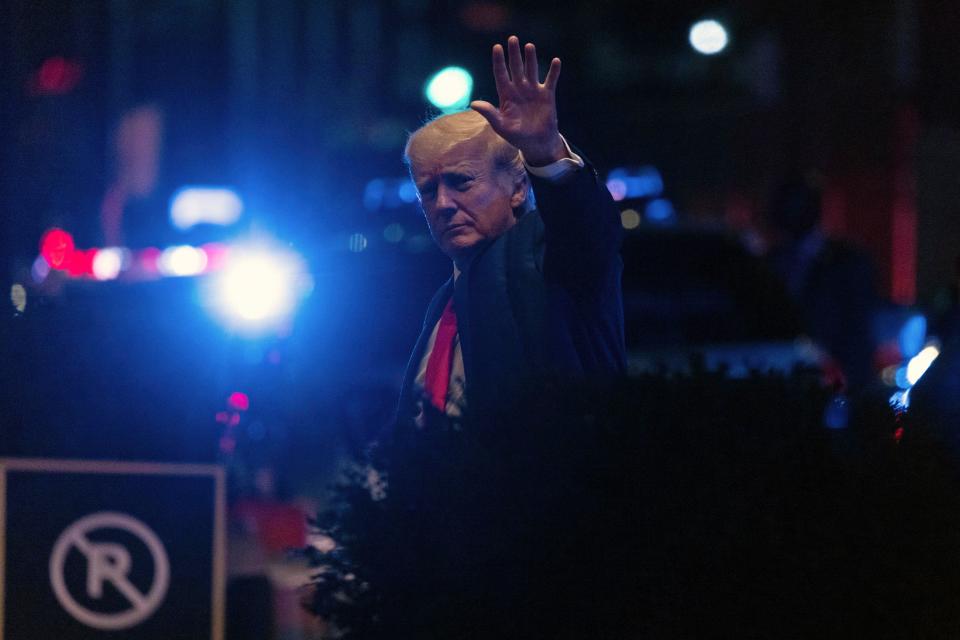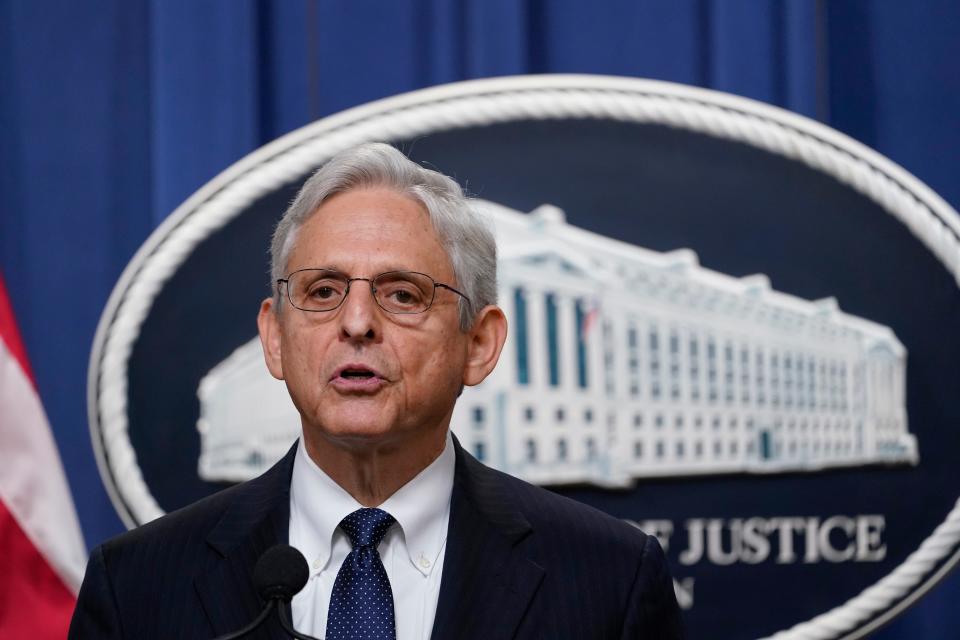Trump calls DOJ probe a 'hoax'; experts, citing the Espionage Act, have a grimmer assessment
Former President Donald Trump is downplaying what the FBI found in its search Monday of his South Florida residence and members-only club, decrying as “a hoax” media reports that said authorities were looking for documents concerning nuclear weapons and other top-secret topics.
“Nuclear weapons issue is a Hoax,” Trump posted to Truth Social on Friday morning.
But if the FBI, the Justice Department and an independent federal judge are to be believed, Trump could be in some serious legal trouble, including what they say could be violations of the U.S. Espionage Act.
"The fact that the search was predicated on evidence of crimes committed under the Espionage Act is of enormous importance," said Ryan Goodman, a national security law expert and former special counsel to the Department of Defense.
"It suggests the Justice Department was given no choice but to act," he said.
The day that started it all: Trump Mar-a-Lago home in Florida searched by FBI in probe into handling of classified documents
What happened Friday: DOJ search warrant shows Trump being probed in connection with espionage statutes
Wining, dining, golf and secrets
According to the warrant and the receipt of what authorities seized, Trump is being investigated for possibly breaking three federal laws: removal or destruction of records, obstructing an investigation and violating the Espionage Act.
That doesn't mean that investigators believe Trump is a spy. The legal predicate that is part of the Espionage Act, 18 U.S.C. §§ 793, pertains to “gathering, transmitting or losing defense information.”

J. William Leonard, the former head of the U.S. National Archives’ Information Security Oversight Office and the government's overseer of classification of records, described it as an antiquated legal catch-all statute that encompasses a range of potential criminal actions related to protecting the national defense.
As a result, it is more likely the investigation is focused on the possible careless handling of classified information and whether Trump’s actions made it easier for top-secret U.S. information to be accessed by foreign spies, Leonard told USA TODAY.
“The real issue is that there was very sensitive information that's protected by statute, and government officials, to include an independent judge, believed that that information was at significant risk, which required this unprecedented action,” he said.
Top-secret information, especially “SCI” special access programs defined as Sensitive Compartmented Information, according to U.S. classification policies, are the most sensitive documents in the U.S. government, often related to how intelligence against foreign adversaries is collected, analyzed and used for targeting top threats to national security.
Documents are classified as top-secret if disclosure of the information contained in them can cause "grave" harm or damage to national security, according to U.S. intelligence agency classification policies.

What makes the documents in question such a potential risk to national security, Leonard said, is that the FBI retrieved them from Mar-a-Lago, a sprawling complex with a notoriously freewheeling atmosphere, where club members and their guests wine and dine, play golf and attend huge catered events such as weddings and New Year’s Eve parties.
A mecca for spies? FBI is examining whether President Trump's Mar-a-Lago resort is vulnerable to foreign agents
Wedding crashers: Trump crashes Nashville socialite's wedding at Mar-a-Lago
'If Mr. Putin had a commercial hotel'
Some of the cartons of documents at Mar-a-Lago were held in a basement storage room with just a padlock on the door, Leonard noted, citing Trump's own statements. Instead, they're supposed to be held by the National Archives, he said, in a secure location not unlike Fort Knox where no one can access them without many layers of authorization and approval.
“Who knows who could have been having access to it? I guarantee you that there's foreign intelligence services who have targeted that location,” Leonard told USA TODAY.
“Just imagine if Mr. (Vladimir) Putin had a commercial hotel establishment on the Black Sea somewhere, where he just allowed anyone to waltz in and hold private functions and things along those lines,” said Leonard, who left the National Archives in 2008. “You don't think the U.S. intelligence services would be all over themselves trying to penetrate that site?”
Leonard and others noted that several people have been detained at or near Mar-a-Lago in recent years, including two Chinese women who were arrested for trespassing on the premises in separate incidents in 2019. The FBI and Justice Department have long warned that Chinese agents are in the United States looking to collect any information they can.
In April 2019, federal authorities said they were reviewing whether then-President Trump's private resort was vulnerable to foreign spying, a person familiar with the matter said. Disclosure of that inquiry followed the arrest of Yujing Zhang, a Chinese national, who arrived at the retreat Trump referred to as his Winter White House with two passports, four cellphones and a thumb drive that investigators said was infected with malware.
Incident in April 2019: Woman with 2 passports, malware arrested at Trump's Mar-a-Lago Club in Florida
Incident in December 2019: Jury finds Chinese national not guilty of trespassing Mar-a-Lago: 'An honest mistake'
According to the search warrant, which was unsealed Friday afternoon, Trump also is suspected of illegally destroying or tampering with classified documents, raising the possibility that he is also under investigation on suspicion of felony obstruction of justice.

A reluctance to indict – but perhaps not for the Espionage Act
But it's the possible Espionage Act violations that give particular urgency, experts told USA TODAY.
Goodman, the former Defense Department special counsel, told USA TODAY that according to his reading of the search warrant unsealed Friday, “the documents Trump kept in a highly unsecure environment involved such vital intelligence information that it could threaten the national security of the United States if it fell into the wrong hands.”
“The Justice Department may be reluctant to indict a former president in general, but not if his actions involve the most serious crimes on the statute books. It is difficult to think of a crime more serious than violations of the Espionage Act.”
What is the Espionage Act?: What to know, from the Sedition Act amendment to declassified documents.
Specifically, the warrant authorizing federal agents to search Mar-a-Lago shows that authorities sought a range of highly sensitive documents, including 11 caches of classified materials. A receipt of what authorities took from the Palm Beach complex confirms that agents did retrieve those documents and that they ranged from confidential to secret all the way to top-secret in nature.
The search warrant documents did not go into detail about what authorities believe is in those boxes, but a Washington Post report, citing officials familiar with the investigation, said some of them involved U.S. nuclear weapons programs.
Subpoena before search
But the other two statutes cited in the search warrant are also serious, legal experts said. One of them, 18 U.S. Code § 1519, involves the “destruction, alteration, or falsification of records in Federal investigations and bankruptcy.” That indicates that authorities presented the judge who authorized the warrant with compelling evidence – enough to establish probable cause – that the documents at Mar-a-Lago were in some way tampered with, either before or after the FBI said it wanted access to them.
The search last Monday wasn’t the first time the Justice Department has sought access to the records.

In a brief news conference Thursday, Attorney General Merrick Garland disclosed that the Justice Department two months earlier had served a subpoena seeking sensitive government documents that investigators believed the former president had stored there after his White House term had ended.
Much remains unknown about the FBI search of Mar-a-Lago and the broader investigation by the Justice Department, which appears to have been underway for many months.
A sworn affidavit filed in support of the search warrant application, which remains sealed, would contain a far more comprehensive description of what authorities are looking for and why they believe that crimes have not only been committed but that evidence of those crimes can be found at Mar-a-Lago, according to David Laufman, who headed the Justice Department’s Counterintelligence and Export Control Section until 2018. In that role, Laufman supervised the investigation and prosecution of cases affecting national security, including mishandling of classified documents.
More: Trump claims Mar-a-Lago documents were 'declassified.' Why experts reject that argument.
'A lot of variables'
In a sign of how serious the Justice Department is taking this investigation, Laufman’s successor in that key position, Jay Bratt, has been heading the effort to get the documents back.
Laufman told USA TODAY that the FBI and Justice Department would have never gotten a judge to approve their application for a search warrant without ample evidence of crimes committed – and ongoing threats to U.S. national security.
“The government carries out search warrants when it becomes concerned that there is evidence of a crime that it needs to obtain in order to pursue additional logical investigative steps while protecting the integrity of that evidence,” Laufman said.
He noted, as well, how risky Mar-a-Lago is as a location for such high-level U.S. secrets.
“And when (classified information) is out in the wild, where it is available to people who have no security clearances, who don't have any legal rights to see classified information, it is particularly in danger of being compromised,” Laufman said.
There's also a potential time factor, including whether a target might destroy evidence or try to hamper an investigation, Laufman said.
"There's a lot of variables."
This article originally appeared on USA TODAY: Espionage Act violations carry major risk for Trump

 Yahoo Movies
Yahoo Movies 
